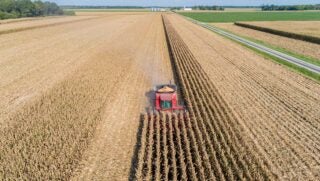Eric Karbowski had no intentions of working in agriculture when he began his career in mental health some 15 years ago.
“My grandparents were farmers, and I married into a farming family. And, today, I find myself working on a mental health programs that focus on helping farmers,” the Michigan State University Extension Specialist said.
In 2016, Michigan State Department of Agriculture and Rural Development (MDARD) reached out to MSU extension in hopes of creating a program that could help reduce the rising number of deaths by suicide the state was seeing. From that request, three curriculums were developed: Communicating with Farmers Under Stress, Weathering the Storm, and Mending the Stress Fence. The programs were successful within the state and soon national-level partners began to come to the table.
“The MSU extension team hosted a summit to train extension educators, which represented 23 states and interest really grew from there,” Karbowski says, “So in partnership with the American Farm Bureau Federation, National Farmers Union, and Farm Credit, the Rural Resilience program was developed.”
Rural Resilience is an open-access training series consisting of three modules created within an online learning management system hosted by Desire 2 Learn. The modules: Managing Stress, Communicating with Distressed Farmers, and Suicide Awareness help learners to identify symptoms of stress and provide coping mechanisms. Additional to the Rural Resilience online program, the partnering organizations have instituted trainings for their employees to provide community and national resources for outreach and further support.
To date, nearly 500 people have signed up to take the free and private online modules through the Rural Resilience training, and more than 100 extension educators from around the U.S. have been trained in the Train-the-Trainer farm stress program to serve their agricultural communities as a mental health resource on this difficult topic.
Brent Brewer of Lamont, Oklahoma, along with two other representatives of the state’s agriculture industry, Rick Shelby and Terrill Coffee, attended a training in late February 2020. Brewer says what he took from that training has helped him to look at conversations and casual engagements with friends, family, and neighbors from a different perspective.
“You have to ask, ‘How are you doing?,’ to the people that you come across in day to day activity. You have to be looking for signs,” he said. “I notice myself, now, looking at my neighbors and my friends” to see signs of stress.
Brewer noted that not everyone exhibits the same signs of stress.
He said that shortly after landing in Oklahoma after the training, the team received their first phone call from an man who was worried about his finances.
“We worked with him and helped him find the right resources,” Brewer said. “It’s like CPR, once you start working with someone, you don’t hang up until they have reached a safe place. You keep them on the line.”
Karbowski agrees, sharing that the goal of the program is not to create master level therapists, but rather to teach the professionals who attend the trainings how to be active listeners and identify which conversations need to be escalated to the next level of support and counseling.
The success and impressive adoption in the short-time the online training has been available, Karbowski attributes to the program’s discreet and anonymous platform.
“The agriculture community is a fiercely independent subculture. Farmers are private and independent,” he said, “This online program is another way we can engage and connect with them in the privacy of their own home — or wherever their time and convenience allows. This is a way we can give them some level of awareness and back that up with resources.”
And much like the Rural Resilience program, itself, the resources available continue to evolve, expanding further into rural communities as more extension and community professionals take part in the Train-the-Trainer opportunities offered through Michigan State University Extension.
Watch the full interview on AGI SureTrack’s CoffeeTalk and review the Rural Resilience courses at https://opencoursesstore.d2l.com/product?catalog=msu_urmfs_2020
This article was written by freelance agriculture journalist Laura Handke.


